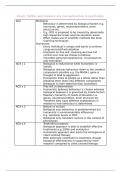Other
AQA A Level Psychology Comparing Approaches Essay Plans
- Course
- Institution
Concise, detailed essay plans covering the whole AQA A Level Psychology Comparing Approaches subtopic, created and used to achieve an A* in the 2024 Psychology A Level exam series.
[Show more]



